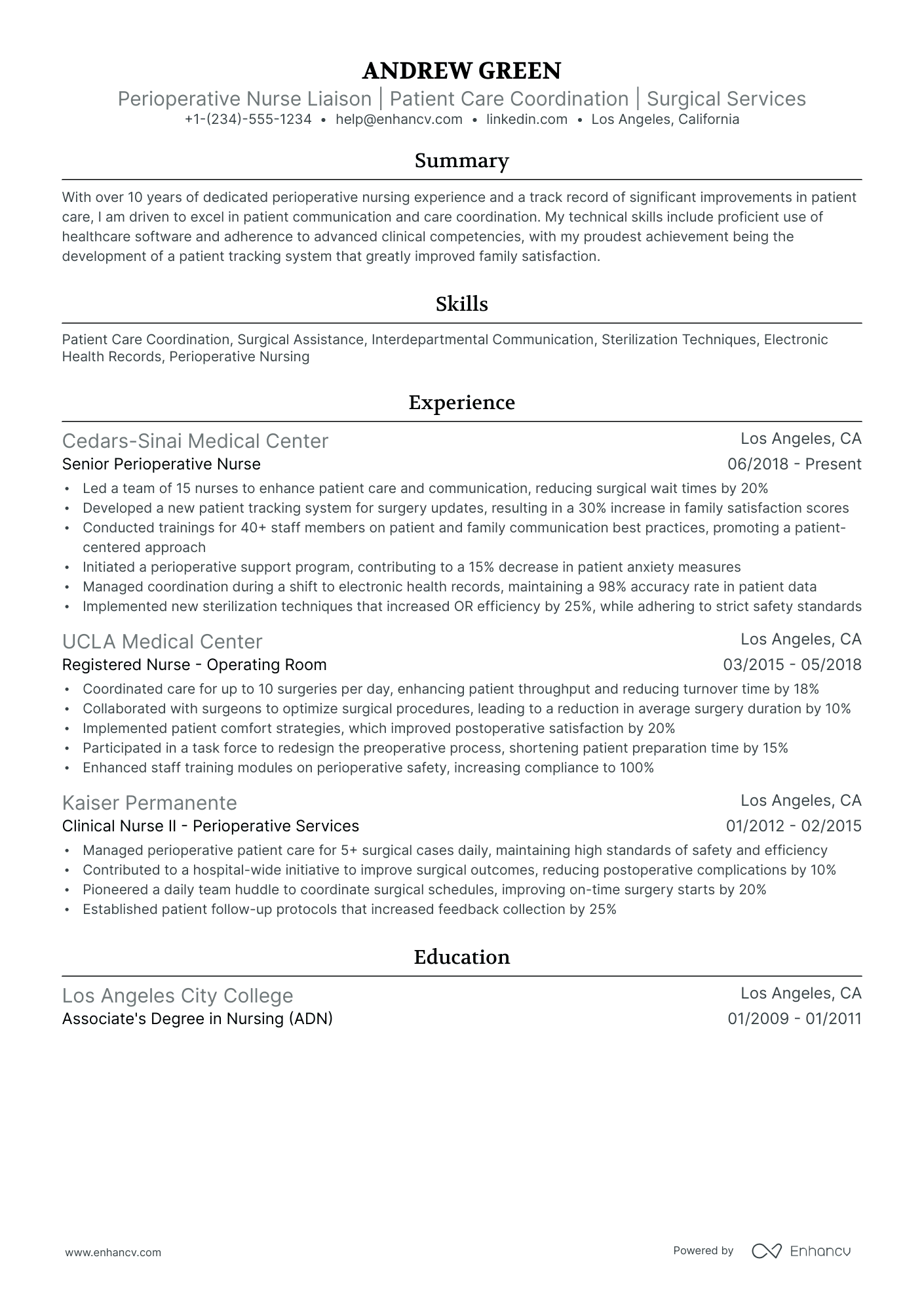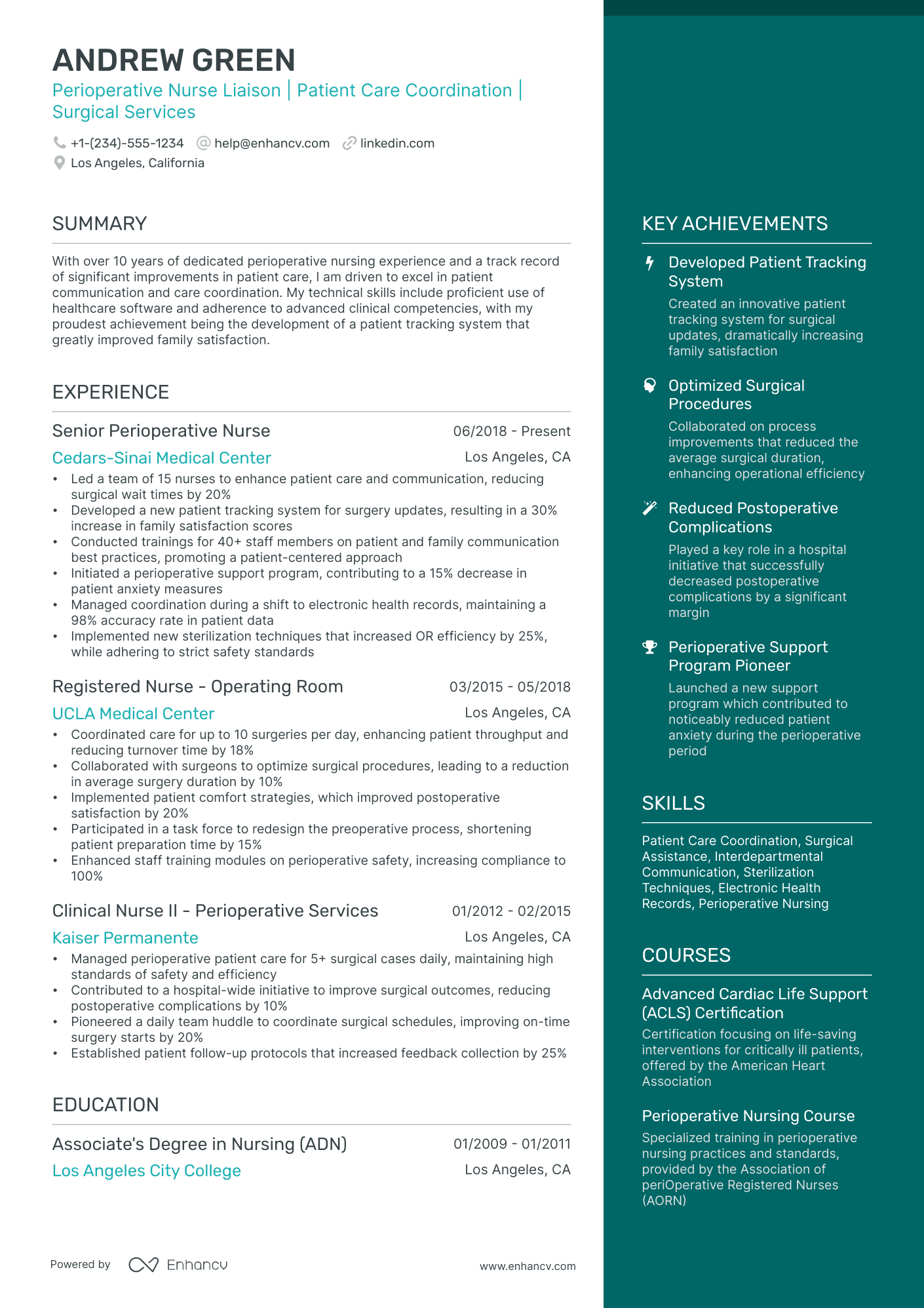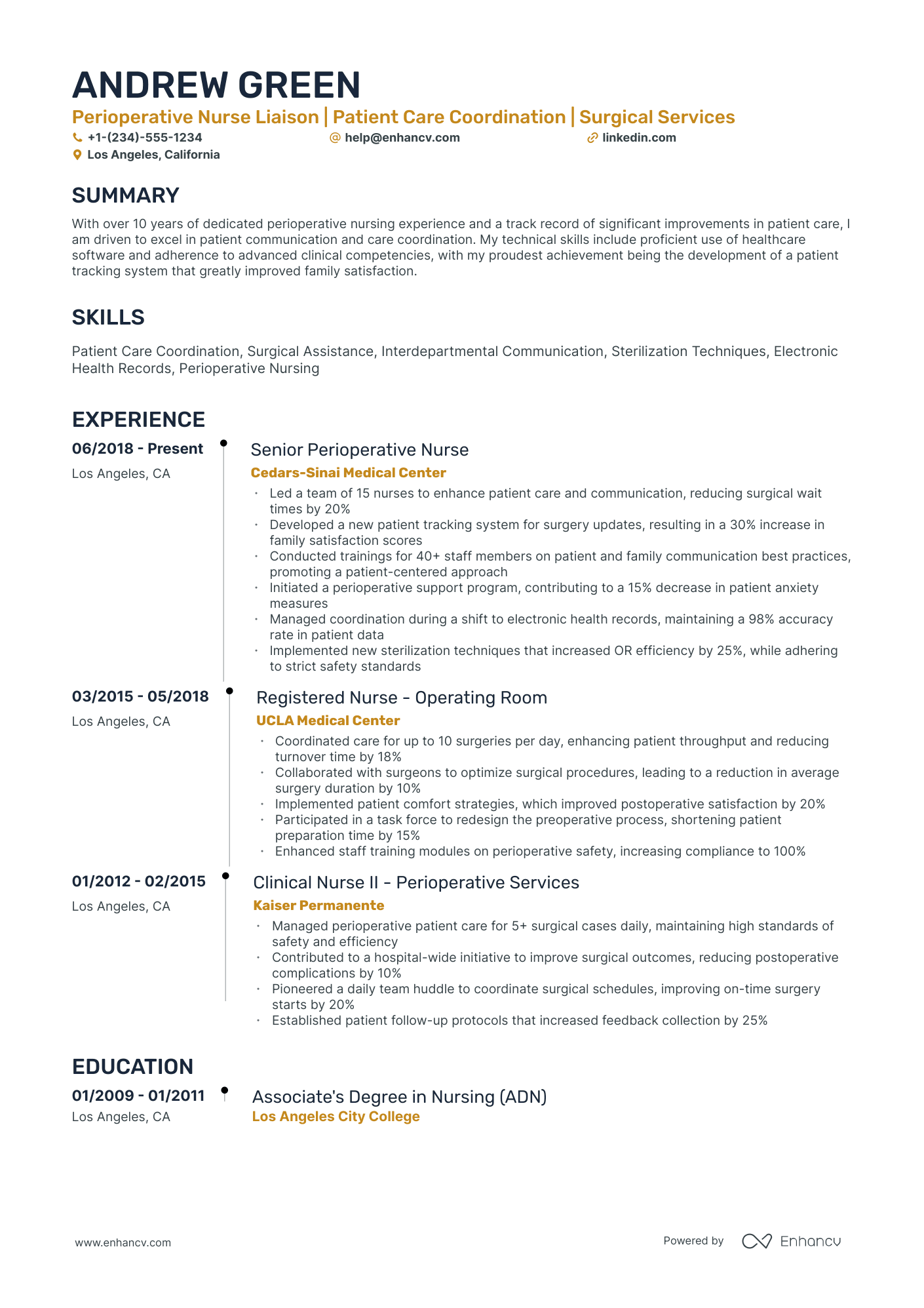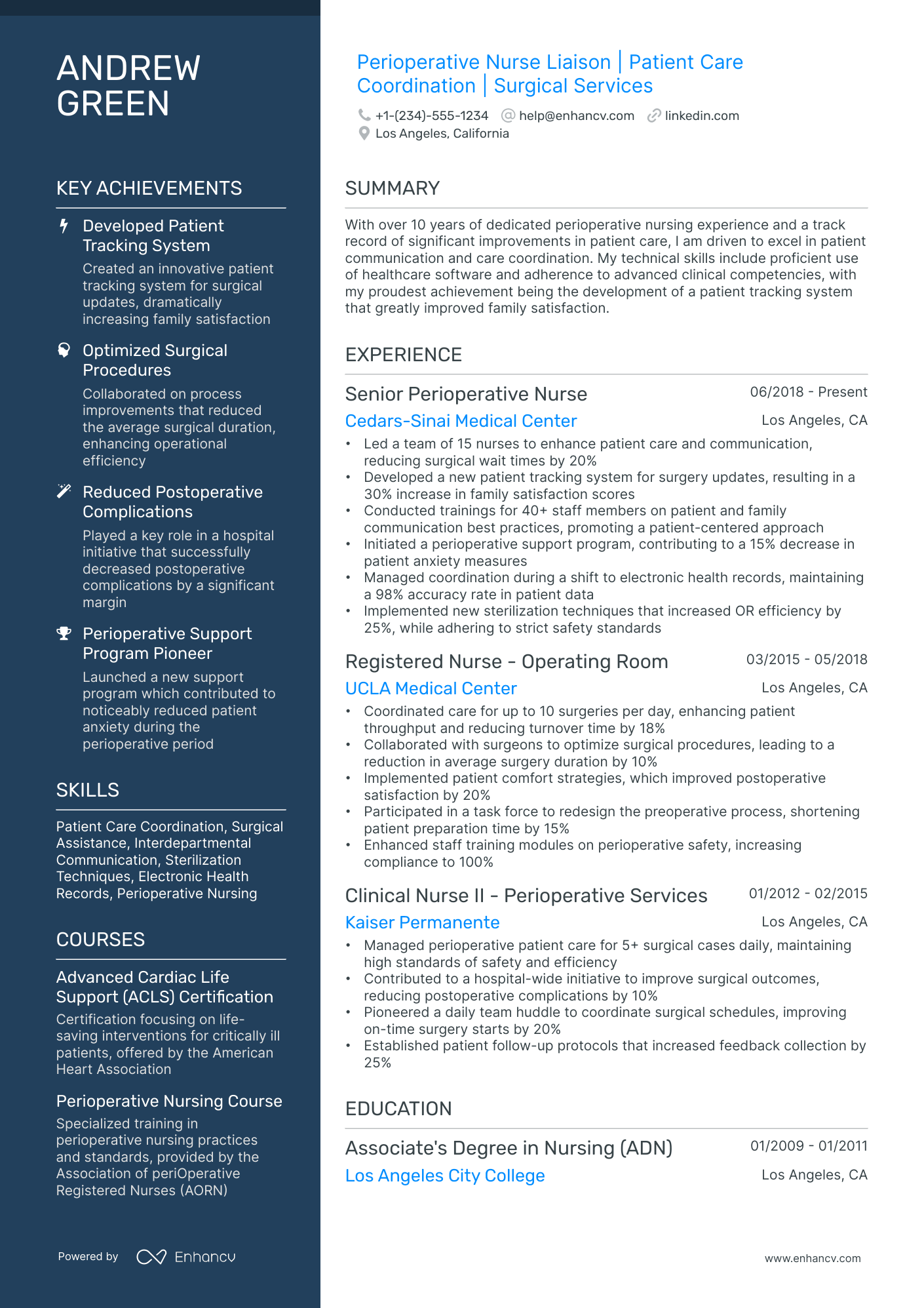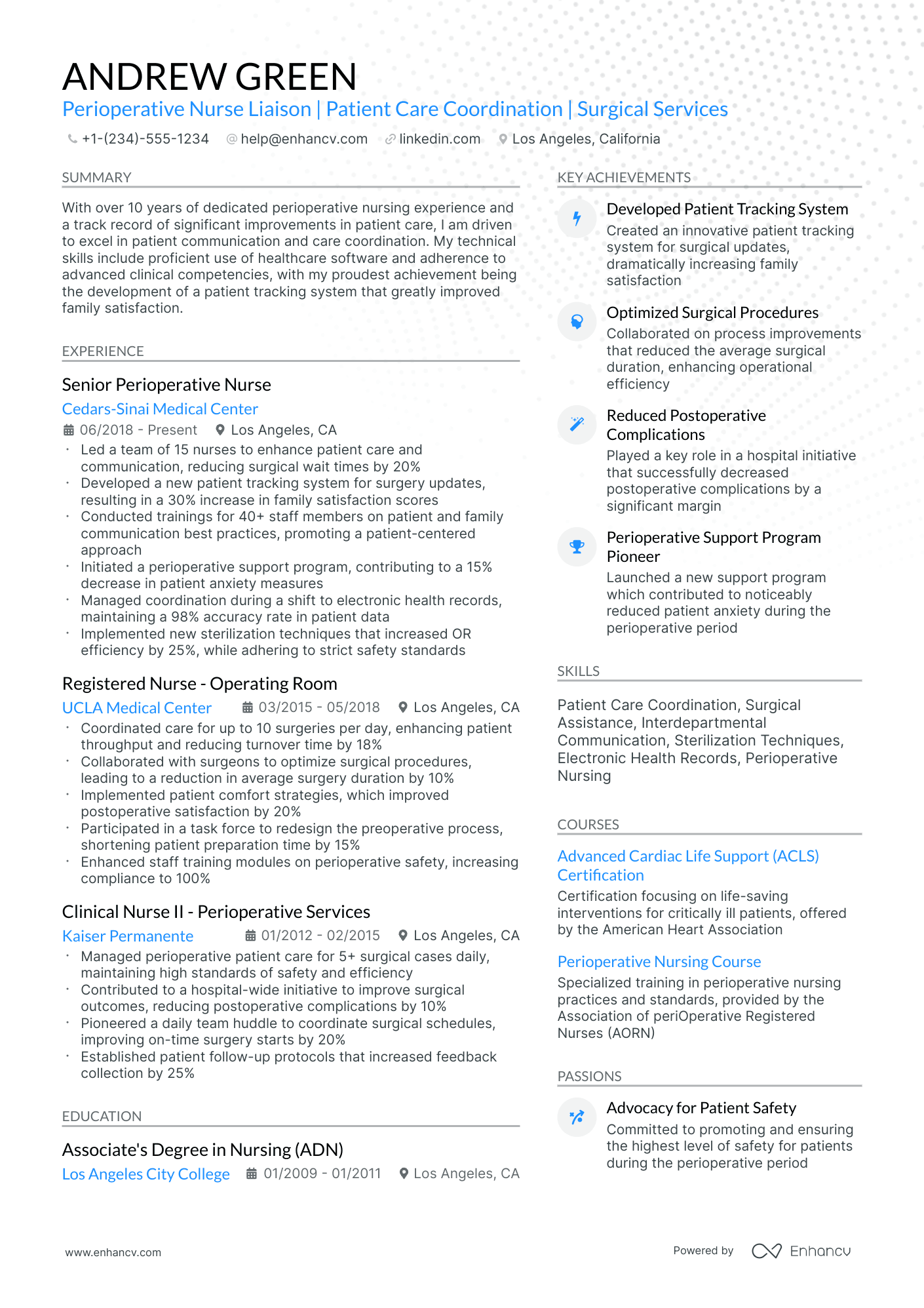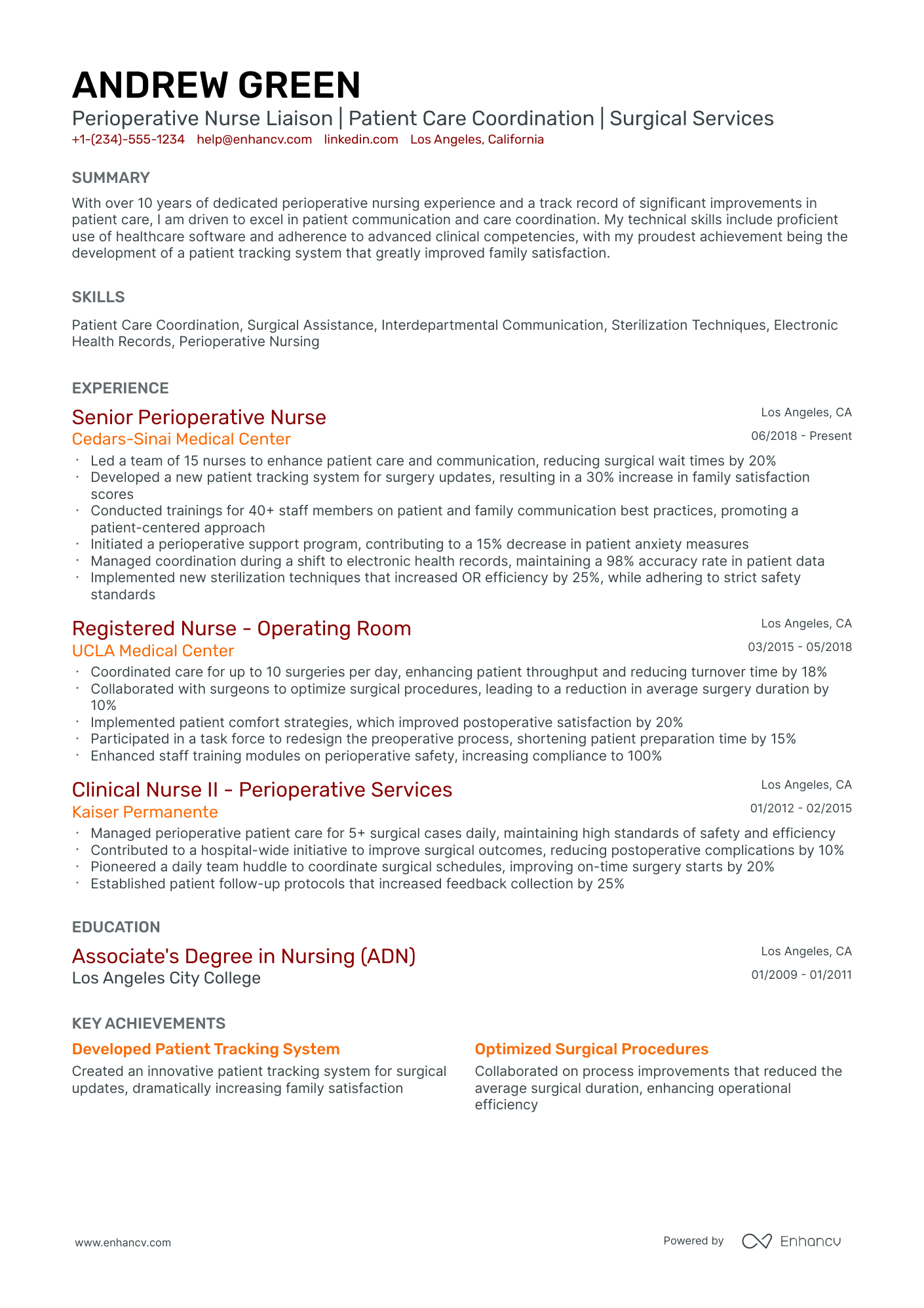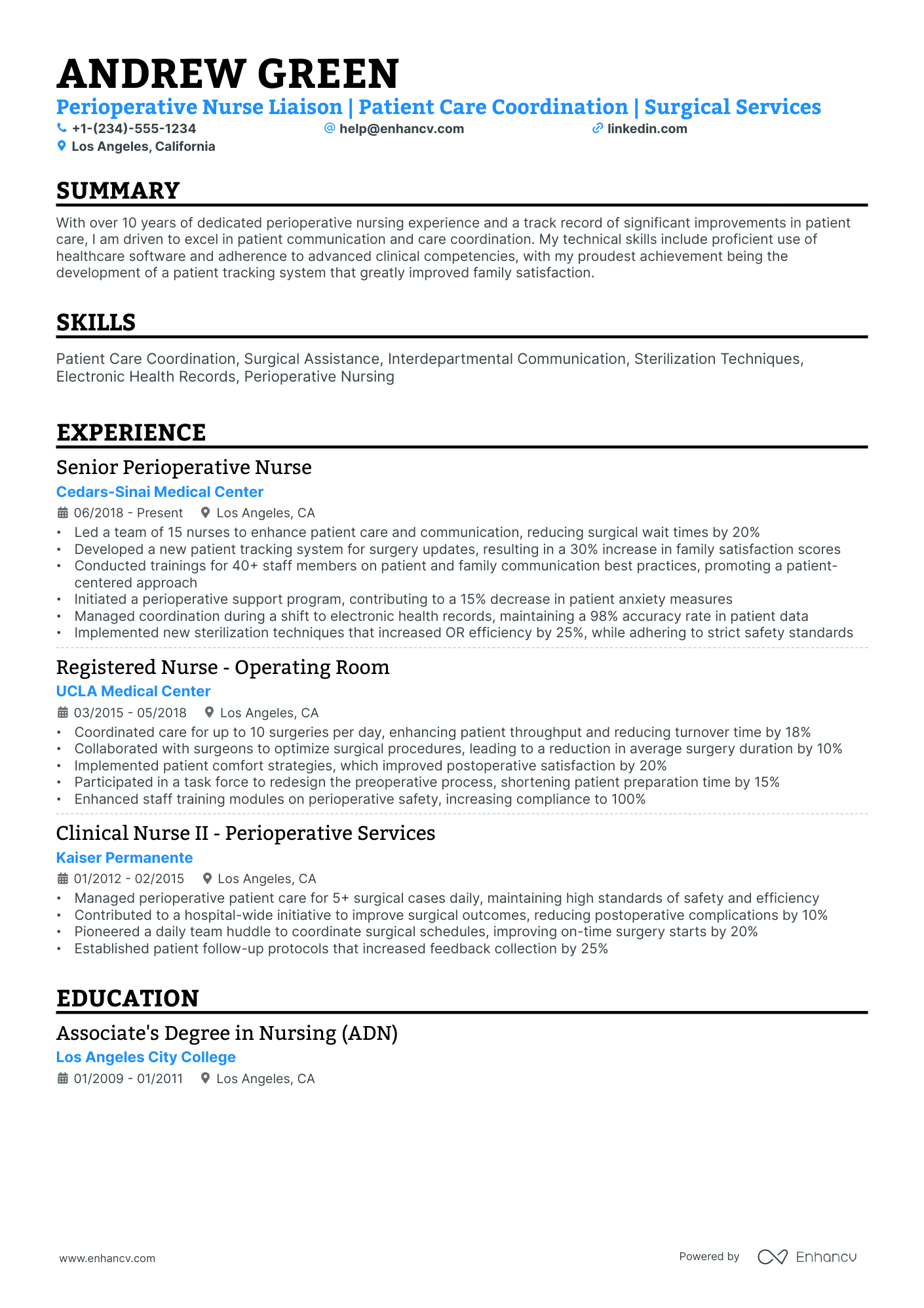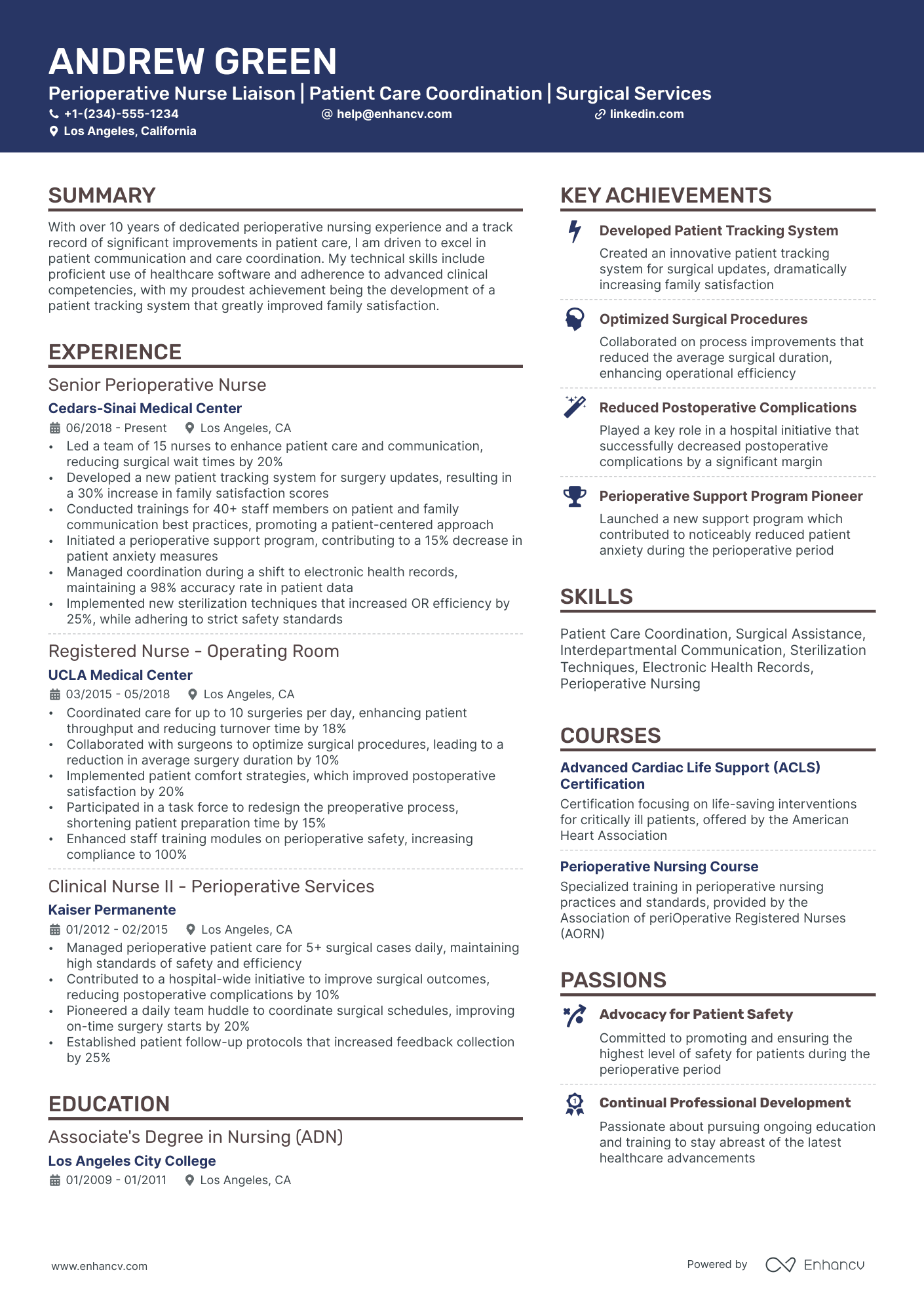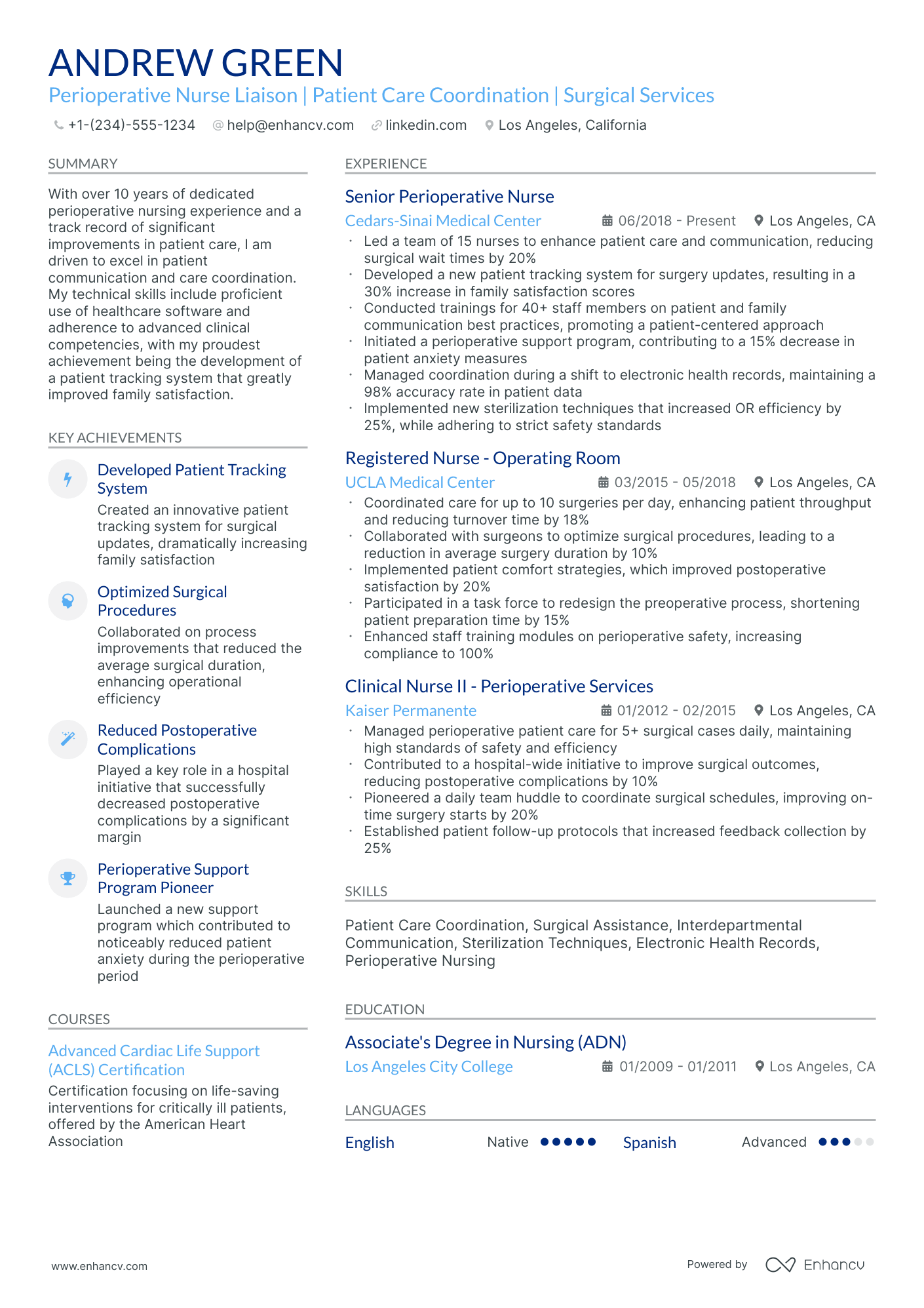As a perioperative nurse, crafting a resume that effectively showcases your specialized skills in a high-pressure surgical environment is a significant challenge. Our guide provides targeted advice that will help you highlight your critical experience and competencies, ensuring your application stands out to potential employers.
- Which sections do you need to include in your resume to meet recruiters' requirements;
- How to write your perioperative nurse resume experience section - even if you have don't have little to no work experience;
- Real-life professional examples to guide you how to write the most important perioperative nurse resume sections;
- Adding even more sections so your perioperative nurse resume stands out with professionalism and your personality.
We've also selected some of the best (and most relevant) resume guides for the perioperative nurse role you're applying for:
Creating the best perioperative nurse resume format: four simple steps
The most appropriate perioperative nurse resume format is defined by precision and a systematic approach. What is more, it should reflect upon how your application will be assessed by recruiters. That is why we've gathered four of the most vital elements to keep in mind when designing your resume:
- It's all about presenting how your experience or skills align with the job. Use the reverse-chronological resume format , if your expertise is relevant to the perioperative nurse role. Otherwise, select the functional skill-based resume format or the hybrid resume format to shift the focus to your skill set.
- Resume header - make sure you've filled out all relevant (and correct) information, like your contact details and link to your portfolio.
- Resume length - unless you've over a decade of applicable expertise in the field, stick with a one-page resume format. If you'd like to present more of your professional experience, go up to two pages.
- Resume file - submit your perioperative nurse resume in a PDF format to ensure all information stays in the same place.
Be aware of location-based layout differences – Canadian resumes, for instance, might differ in format.
Upload & Check Your Resume
Drop your resume here or choose a file. PDF & DOCX only. Max 2MB file size.
PRO TIP
Highlight any significant extracurricular activities that demonstrate valuable skills or leadership.
Essential sections that should make up your perioperative nurse resume include:
- The header - with your contact details (e.g. email and telephone number), link to your portfolio, and headline
- The summary (or objective) - to spotlight the peaks of your professional career, so far
- The experience section - with up to six bullets per role to detail specific outcomes
- The skills list - to provide a healthy mix between your personal and professional talents
- The education and certification - showing your most relevant degrees and certificates to the perioperative nurse role
What recruiters want to see on your resume:
- Experience with various surgical procedures and operating room environments
- Proficiency in perioperative nursing care standards and patient safety protocols
- Ability to collaborate effectively with surgeons, anesthesiologists, and other healthcare professionals
- Knowledge of sterilization techniques and infection control measures relevant to the operating room
- Demonstrated skills in patient assessment, perioperative planning, and post-operative recovery
Experts' advice on writing your perioperative nurse resume experience
While the excitement and motivation for writing your perioperative nurse resume was present in the first hour (or so), you now find yourself staring at the blank page.
The resume experience section is the one that allows you to make a memorable impression by matching job requirement with your past jobs and accomplishments.
To help you write this resume section, here are four mistakes you need to avoid:
- Listing every job you have had so far, including the irrelevant ones. Before that, consider each of your past roles based on relevancy to the role. It may be the case that the job you had 15 years ago may have taught you invaluable skills that are appropriate for the role;
- Including irrelevant work experience items. Those are past jobs that aren't linked with the role you're applying for (or so they seem). Consider how your past jobs will serve your professional presentation: will they be filling in a gap in your work history, or just taking up space?
- Focusing on responsibilities instead of accomplishments. Your perioperative nurse resume shouldn't just be telling recruiters what you did in the past - as it's most often the case that candidates have had similar responsibilities. But, rather, the experience section should showcase the success you've attained in each past role, thanks to your unique skill set;
- Consider listing just your professional experience. Any role you've had in the past - e.g. volunteering, internships, etc. - can make it into your perioperative nurse resume experience section. Make sure to include it alongside numbers and results.
Two more things you need to remember about your resume experience section.
The first are keywords. Or those specific job requirements that are crucial for the role . Ensure you've integrated them across your experience section to get sorted closer to the ideal candidate profile by the Applicant Tracker System (ATS).
The second are action verbs. Each of your experience bullets should start with a strong action verb, followed by your specific skill and your on the job achievements. Follow this formula to hint to recruiters what your unique value as a professional is.
Still with us? In the next section, we will show you how industry-leading professionals have avoided the four most common mistakes, while integrating keywords and action verbs in their experience section.
- Coordinated with a team of surgeons and anesthesiologists to prepare for over 300 complex surgical procedures, ensuring a sterile and safe environment.
- Spearheaded the implementation of a new patient charting system that increased department efficiency by 25%.
- Trained and mentored 15 junior nurses on perioperative best practices, enhancing team performance and patient satisfaction.
- Managed preoperative patient assessments for approximately 20 patients weekly, reducing pre-surgery anxiety and improving recovery times.
- Conducted intra-operative duties, assisting with an average of 15 surgeries per week, maintaining an impeccable record of patient safety.
- Championed a quality improvement project to minimize surgical site infections, which led to a 30% reduction in post-operative complications.
- Pioneered a perioperative care seminar attended by over 100 healthcare professionals, enhancing knowledge sharing across the institution.
- Collaborated in the design of a perioperative workflow that improved surgical turnaround times by 20%.
- Actively participated in over 1,200 successful surgeries, establishing a track record of exemplary patient care and diligence.
- Deployed advanced monitoring techniques that increased patient safety during high-risk surgeries by 40%.
- Streamlined surgical supply inventory management, resulting in an annual cost savings of $50,000.
- Delivered comprehensive post-operative care, reducing recovery time and improving patient satisfaction scores by 35%.
- Oversaw the perioperative phase of care for over 500 pediatric patients, tailoring approaches to meet the unique needs of younger patients.
- Contributed to a cross-functional team that decreased operating room turnover time by 15%, optimizing the surgical schedule.
- Implemented evidence-based practice guidelines that improved surgical outcomes and patient recovery rates.
- Orchestrated the rollout of a perioperative electronic health records system across the hospital, increasing accuracy in patient records.
- Facilitated over 750 anesthetic recoveries, prioritizing patient comfort and safety with a 98% success rate.
- Developed a continuing education program for perioperative nurses that improved compliance with national surgical standards.
- Directed perioperative services for cardiology, participating in over 300 cardiothoracic surgeries with successful patient outcomes.
- Launched a department-wide initiative to enhance teamwork, slashed miscommunication errors by 25%.
- Managed a program to fast-track the OR setup process, allowing for an additional 2 surgeries to be conducted per day on average.
- Led a perioperative team during emergency surgeries, achieving a 90% success rate in life-saving procedures.
- Implemented a surgical patient follow-up program, which reduced readmission rates by 18% within a 6-month period.
- Trained 20 new perioperative nurses in robotic surgical assistance, keeping the hospital at the forefront of technological advancements in surgery.
The following content includes information from "O*NET OnLine" by the U.S. Department of Labor, Employment and Training Administration (USDOL/ETA). Used under the CC BY 4.0 license. The data represents the top responsibilities present on the task lists for perioperative nurse professionals.
Top Responsibilities for Perioperative Nurse:
- Record patients' medical information and vital signs.
- Administer medications to patients and monitor patients for reactions or side effects.
- Maintain accurate, detailed reports and records.
- Monitor, record, and report symptoms or changes in patients' conditions.
- Provide health care, first aid, immunizations, or assistance in convalescence or rehabilitation in locations such as schools, hospitals, or industry.
- Consult and coordinate with healthcare team members to assess, plan, implement, or evaluate patient care plans.
- Direct or supervise less-skilled nursing or healthcare personnel or supervise a particular unit.
- Instruct individuals, families, or other groups on topics such as health education, disease prevention, or childbirth and develop health improvement programs.
- Modify patient treatment plans as indicated by patients' responses and conditions.
- Conduct specified laboratory tests.
Quantifying impact on your resume
- Quantify the number of surgical procedures assisted with, showcasing the breadth of experience in the operating room.
- Highlight the average number of cases managed per week to demonstrate the ability to work in a high-volume setting.
- Mention the percentage of on-time starts for surgeries, reflecting efficiency and time management skills.
- Include the number of different surgical teams collaborated with, indicating teamwork and adaptability.
- Detail the specific number of perioperative nursing protocols updated or created to improve patient outcomes.
- State the decrease in patient recovery times due to optimized pre- and post-operative care procedures.
- List any quantifiable reduction in surgical site infection rates achieved by implementing new sterilization techniques.
- Provide the amount of continuing education hours completed to show a commitment to professional development and staying current with industry standards.
Action verbs for your perioperative nurse resume
Remember these four tips when writing your perioperative nurse resume with no experience
You've done the work - auditing the job requirements for keywords and have a pretty good idea of the skill set the ideal candidate must possess.
Yet, your professional experience amounts to a summer internship .
Even if you have limited or no professional expertise that matches the role you're applying for, you can use the resume experience section to:
- List extracurricular activities that are relevant to the job requirements. Let's say you were editor-in-chief of your college newspaper or part of the engineering society. Both activities have taught you invaluable, transferrable skills (e.g. communication or leadership) that can be crucial for the job;
- Substitute jobs with volunteer experience. Participating in charity projects has probably helped you develop an array of soft skills (e.g. meeting deadlines and interpersonal communications). On the other hand, volunteering shows potential employers more about you: who you are and what are the causes you care about;
- Align job applications with your projects. Even your final-year thesis work could be seen as relevant experience, if it's in the same industry as the job you're applying for. Ensure you've listed the key skills your project has taught you, alongside tangible outcomes or your project success;
- Shift the focus to your transferrable skills. We've said it before, but recruiters will assess your profile upon both job requirements and the skills you possess. Consider what your current experience - both academic and life - has taught you and how you've been able to develop your talents.
Recommended reads:
PRO TIP
If you happen to have some basic certificates, don't invest too much of your perioperative nurse resume real estate in them. Instead, list them within the skills section or as part of your relevant experience. This way you'd ensure you meet all job requirements while dedicating your certificates to only the most in-demand certification across the industry.
Perioperative nurse skills and achievements section: must-have hard and soft skills
A key principle for your perioperative nurse resume is to prominently feature your hard skills, or the technologies you excel in, within the skills section. Aim to list several hard skills that are in line with the job's requirements.
When it comes to soft skills, like interpersonal communication abilities and talents, they're trickier to quantify.
Claiming to be a good communicator is one thing, but how can you substantiate this claim?
Consider creating a dedicated "Strengths" or "Achievements" section. Here, you can describe how specific soft skills (such as leadership, negotiation, problem-solving) have led to concrete achievements.
Your perioperative nurse resume should reflect a balanced combination of both hard and soft skills, just as job requirements often do.
Top skills for your perioperative nurse resume:
Surgical Instrumentation
Anesthesia Administration
Patient Monitoring Systems
Sterilization Techniques
Electronic Health Records (EHR) Management
IV Therapy
Surgical Safety Protocols
Infection Control Procedures
Operating Room Equipment Operation
Emergency Response Procedures
Communication Skills
Attention to Detail
Team Collaboration
Critical Thinking
Problem Solving
Time Management
Empathy
Adaptability
Stress Management
Decision Making
Next, you will find information on the top technologies for perioperative nurse professonals from "O*NET OnLine" by the U.S. Department of Labor, Employment and Training Administration (USDOL/ETA). Used under the CC BY 4.0 license.
Top technologies for Perioperative Nurse’s resume:
- eClinicalWorks EHR software
- Henry Schein Dentrix
- Google Docs
- Microsoft Word
- Database software
- Microsoft Access
PRO TIP
Always remember that your perioperative nurse certifications can be quantified across different resume sections, like your experience, summary, or objective. For example, you could include concise details within the expertise bullets of how the specific certificate has improved your on-the-job performance.
Education section and most popular perioperative nurse certifications for your resume
Your resume education section is crucial. It can indicate a range of skills and experiences pertinent to the position.
- Mention only post-secondary qualifications, noting the institution and duration.
- If you're still studying, highlight your anticipated graduation date.
- Omit qualifications not pertinent to the role or sector.
- If it provides a chance to emphasize your accomplishments, describe your educational background, especially in a research-intensive setting.
Recruiters value perioperative nurse candidates who have invested their personal time into their professional growth. That's why you should include both your relevant education and certification . Not only will this help you stand out amongst candidates, but showcase your dedication to the field. On your perioperative nurse resume, ensure you've:
- Curated degrees and certificates that are relevant to the role
- Shown the institution you've obtained them from - for credibility
- Include the start and end dates (or if your education/certification is pending) to potentially fill in your experience gaps
- If applicable, include a couple of job advert keywords (skills or technologies) as part of the certification or degree description
If you decide to list miscellaneous certificates (that are irrelevant to the role), do so closer to the bottom of your resume. In that way, they'd come across as part of your personal interests, instead of experience. The team at Enhancv has created for you a list of the most popular perioperative nurse certificates - to help you update your resume quicker:
The top 5 certifications for your perioperative nurse resume:
- Certified Nurse Operating Room (CNOR) - Competency & Credentialing Institute (CCI)
- Certified perioperative nurse (CPN) - Competency & Credentialing Institute (CCI)
- Certified Ambulatory Surgery Nurse (CASN) - Medical-Surgical Nursing Certification Board (MSNCB)
- Advanced Cardiac Life Support (ACLS) - American Heart Association (AHA)
- Certified Post Anesthesia Nurse (CPAN) - American Board of Perianesthesia Nursing Certification, Inc. (ABPANC)
The content below includes information from "O*NET OnLine" by the U.S. Department of Labor, Employment and Training Administration (USDOL/ETA). Used under the CC BY 4.0 license. The data represents the top associations for perioperative nurse professionals.
Top US associations for a Perioperative Nurse professional
- AFT Nurses and Health Professionals
- American Association of Colleges of Nursing
- American Association of Critical-Care Nurses
- American Nurses Association
- American Society of PeriAnesthesia Nurses
PRO TIP
Highlight any significant extracurricular activities that demonstrate valuable skills or leadership.
Recommended reads:
Perioperative nurse resume summaries or objectives: real-world samples for best industry practices
Grasp recruiters' attention from the get-go of your application with a professional perioperative nurse resume summary or objective.
It's wise to select the:
- Resume objective , if you don't happen to have much experience alignment and would like to more prominently feature your dreams and personality.
- Resume summary , if you'd like to have a more standard approach to your application and feature up to five career highlights to help you stand out.
Writing your resume summary or objective should be tailored to each role you apply for.
Think about what would impress the recruiters and go from there.
But, if you need further help with this introductory section, check out some real-world samples in the next part of this guide:
Resume summaries for a perioperative nurse job
- With over 8 years of dedicated experience in perioperative nursing within a top-tier hospital, I bring a profound understanding of surgical procedures, expert care for pre- and post-operative patients, and a proven record of improved recovery outcomes through the implementation of evidence-based practices.
- As a former emergency medical technician seeking to transition into perioperative nursing, I leverage 5 years of high-pressure medical response situations to ensure a seamless integration into surgical teams, bringing forth an exceptional ability to remain calm and focused during critical moments.
- Bringing forward a strong background as a clinical research coordinator of 7 years, my transition to perioperative nursing is driven by a passion to directly contribute to patient care during surgical operations, utilizing solid data analysis skills for better patient outcomes.
- Enthusiastic to apply my 10 years of meticulous surgical assistance and patient preparation expertise to the challenging and rewarding field of perioperative nursing, with a highlight on my leadership in implementing a hospital-wide infection control protocol that reduced surgical site infections by 20%.
- Eager to embark upon a career in perioperative nursing, my objective is to put into practice my exceptional educational background in nursing science and my strong desire to contribute to patient safety and positive surgical experiences.
- As a recent nursing graduate, I am excited by the prospect of beginning my professional journey, focusing on perioperative care where I can apply my comprehensive knowledge from academic training and my commitment to patient advocacy and quality care in the surgical environment.
Optimize your resume summary and objective for ATS
Drop your resume here or choose a file.
PDF & DOCX only. Max 2MB file size.
Average salary info by state in the US for perioperative nurse professionals
Local salary info for Perioperative Nurse.” Source: My Next Move, National Center for O*NET Development. Accessed 10/15/2024
| State | Average Salary (in USD) |
|---|---|
| US National Average | $86,070 |
| California (CA) | $133,990 |
| Texas (TX) | $85,110 |
| Florida (FL) | $80,960 |
| New York (NY) | $104,570 |
| Pennsylvania (PA) | $82,780 |
| Illinois (IL) | $82,470 |
| Ohio (OH) | $79,940 |
| Georgia (GA) | $83,620 |
| North Carolina (NC) | $79,580 |
| Michigan (MI) | $81,710 |
Extra sections to include in your perioperative nurse resume
What should you do if you happen to have some space left on your resume, and want to highlight other aspects of your profile that you deem are relevant to the role? Add to your perioperative nurse resume some of these personal and professional sections:
- Passions/Interests - to detail how you spend both your personal and professional time, invested in various hobbies;
- Awards - to present those niche accolades that make your experience unique;
- Publications - an excellent choice for professionals, who have just graduated from university or are used to a more academic setting;
- Volunteering - your footprint within your local (or national/international) community.
Key takeaways
- The logic of your resume presentation should follow your career highlights and alignment with the role;
- Curate information within different sections (e.g. summary, experience, etc.) that helps highlight your strengths;
- Exclude from your resume irrelevant experience items - that way you'd ensure it stays no longer than two pages and is easy to read;
- Dedicate space within the summary, experience, and/or achievements to highlight precisely why you're the best candidate for the role via your previous success;
- Both your technical and people capabilities should also play a crucial role in building up your perioperative nurse application. Prove your skill set in various resume sections.
